Weekdays Program Committee FrontendConf. Interview with Sergey Popov
The FrontendConf Program Committee is responsible for the selection of applications, prepares a program, schedule, is responsible for the stands and the concept. At the same time, PC participants also oversee the speakers' reports. The task of the curator is to help with the structure, content and bring the report to the ideal. There are from one to a couple of dozen such reports from a PC member, and you also need to prepare a program and your report if the PC member is also a speaker at the conference.
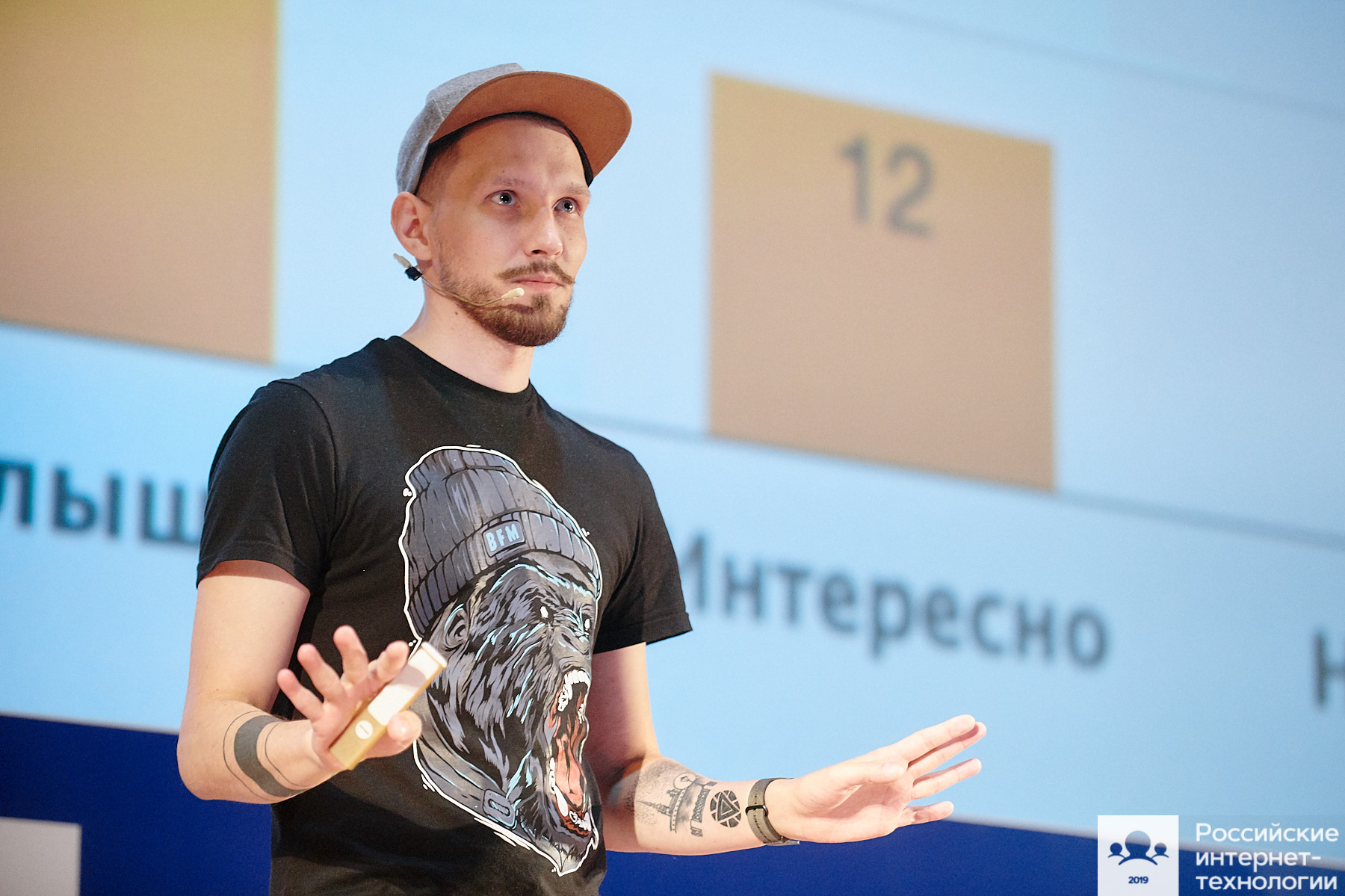
On the eve of FrontendConf, we interviewed Sergey Popov (@sergeytovarov) and asked about everything in more detail. Sergey is a member of the PC, leader League A., speaker. We asked him how the preparations for the conference are going, what reports he takes to curate and what to expect from the audience, why he is speaking, what his new report is about, and why to attend the conference.
- Tell us about your experience. What do you do professionally, what do you do in FrontendConf?
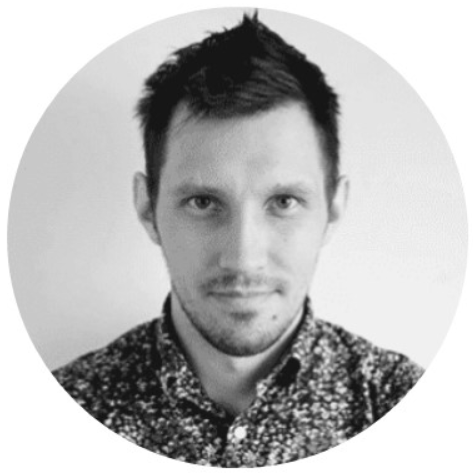 Sergey : In short, I worked for more than 8 years as a layout designer, front-end developer, and UI developer. I was always closer to the design side and layout of the interface than to JavaScript and interaction with the backend.
Sergey : In short, I worked for more than 8 years as a layout designer, front-end developer, and UI developer. I was always closer to the design side and layout of the interface than to JavaScript and interaction with the backend.
For the past two years, I have been leading League A. front-end development outsourcing, and in parallel at HTML Academy I have been leading the direction that graduates are engaged in: from graduation to employment. I control everything that happens to them during this period.
I speak a lot at specialized conferences. I go to them not only for the sake of performances, but also for the sake of the community. I organize conferences, participate in some of them in the same role as in the FrontendConf Program Committee.
In PC, I keep applications from beginning to end: I train, help improve reports, and reveal interesting aspects. The PC has a distribution of "specializations." Everyone does what he has expertise in - so reports get better. My "specialization" - reports on layout, UI, CSS, design, soft skills. These are "light" themes, I do not take "hardcore".
- Why and how did you get on the FrontendConf program committee?
Sergey : I got into the PC about three years ago, and with full immersion I participate in the preparation for the second year in a row. In the past and this year, it was RIT ++ and FrontendConf in Moscow. Prior to that, I helped as a consultant.
I participate in PC because I am interested in community development. I often travel to conferences and see bad reports. Being in the Program Committee, I can share my experience with speakers and influence the situation so that there are fewer bad reports.
Since then, participation in the PC has become more than counseling. We influence more issues, not only reports, but also the program, stage preparation, and concept. We make decisions on which the quality of the conference depends - this is our responsibility. I love such things, and this is another reason why I am in PC.
- How many speakers do you have?
Sergey : Performances take a lot of time and effort. I have repeatedly tried to quit this case. But at some point I realized that conferences are necessary both for work and for constant practice.
I have long outgrown the age when I attended conferences simply because I like it, without any meaning. I am looking for meaning in this for myself, for the main and additional activities, for my own promotion.

I speak a lot: with various reports, with repeated reports, with a series of reports - only about 10-15 performances per year. A decrease in activity is not expected, and it is not yet clear due to what they may become smaller.
- How many reports did you oversee for FrontendConf? Tell us more about them, what will be useful for conference guests in them?
Sergey : Only for FrontendConf 2019 I oversaw 15-20 reports. Not all of them were accepted, so I’ll tell you about those that fell into the program.
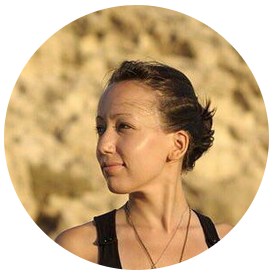 Natasha Gabitova will talk about Camera Rig . This is an interesting way to create cool things with WebGL, for example, your own worlds. The feel of the world will depend on the camera. One of the camera control techniques and user experience, respectively, is called "Rig". It will be interesting to listen to how this is done and expand the horizons of any person.
Natasha Gabitova will talk about Camera Rig . This is an interesting way to create cool things with WebGL, for example, your own worlds. The feel of the world will depend on the camera. One of the camera control techniques and user experience, respectively, is called "Rig". It will be interesting to listen to how this is done and expand the horizons of any person.
 The next report is by Andrey Smirnov “ The state of soft skills ”. Andrey will talk about his huge study on soft skills. This is not a retelling of one’s own opinion - the report is based on statistics on interactions, relationships with each other, which are collected from the market. Given that statistics were collected from the front-end, the topic is relevant for FrontendConf participants.
The next report is by Andrey Smirnov “ The state of soft skills ”. Andrey will talk about his huge study on soft skills. This is not a retelling of one’s own opinion - the report is based on statistics on interactions, relationships with each other, which are collected from the market. Given that statistics were collected from the front-end, the topic is relevant for FrontendConf participants.
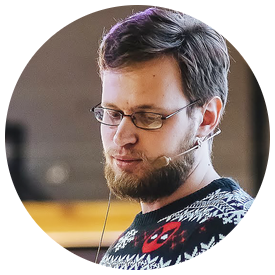
Nikita Dubko will present the topic “ CSS - a programming language ”. He will talk about how to look at CSS capabilities from a different perspective. Nikita does a great job himself, he doesn’t need to be especially lead, but an opinion from the outside will not hurt anyone.
Nikita spoke in more detail about his report in a separate interview .
 Next - Victor Rusakovich with a report on skeletons . He will tell you how to improve the download experience if your application loads for a long time and you can’t do anything about it. With the help of skeletons, it is possible to improve the perception of a long load when the page is schematically displayed at the time of loading. He will tell about everything: what is it, why and how.
Next - Victor Rusakovich with a report on skeletons . He will tell you how to improve the download experience if your application loads for a long time and you can’t do anything about it. With the help of skeletons, it is possible to improve the perception of a long load when the page is schematically displayed at the time of loading. He will tell about everything: what is it, why and how.
 Sofya Valitova from VK will talk about data types in CSS . This is a report on CSS programming, not about internal typing. Sophia ran into a rather simple problem - with the
Sofya Valitova from VK will talk about data types in CSS . This is a report on CSS programming, not about internal typing. Sophia ran into a rather simple problem - with the
function, which worked out the wrong way. But to understand how it works, I had to plunge into the bowels of the specification and pull out everything that was possible from there. I love people who read specifications. Therefore, I liked the report, and it will be even better for the conference.
 Nastya Kalashnikova will make the rules of a conscious career as a developer . She is a very cool soft skills specialist, practicing psychologist and HR in IT. She will have a helpful presentation on how and why you need to be aware of certain things that happen in your career. Nastya will show by examples what can be achieved if one approaches the career consciously, and what will happen if this is not done.
Nastya Kalashnikova will make the rules of a conscious career as a developer . She is a very cool soft skills specialist, practicing psychologist and HR in IT. She will have a helpful presentation on how and why you need to be aware of certain things that happen in your career. Nastya will show by examples what can be achieved if one approaches the career consciously, and what will happen if this is not done.
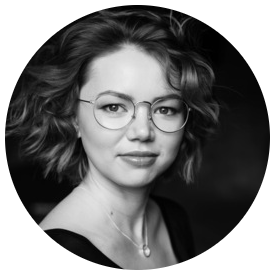
I also oversee the report by Julia Muzafarova “ Make a World on Pure CSS ” about cool animations in CSS. Julia will tell you how to make complex animations, why it is needed, why it’s interesting how it pumps skills and allows you to look at CSS in a new way.
Each report is interesting in its topic and in its direction. I hope everyone will like them.
- Among these reports there are many experienced speakers, but there are also beginners. Who is easier to work with?
Sergey : All the guys are experienced, but someone has more. Relatively speaking, Nikita Dubko, Andrey Smirnov are experienced speakers, they speak a lot, but there are those who speak less. The more experienced ones are easier, because you practically don't have to work with them. They are able to independently evaluate what they are doing. They do not need special advice, only a view from the side.
On the other hand, the opinion of the PC will not always be heard by the speaker if the views differ. Perhaps the speaker will even agree on something, but the experience of speaking requires speaking differently.
Beginners are easier to direct in the desired interesting direction. I look at the report from a position of interest to the audience. My task, as a curator, is to bring him to a state where he is interesting to everyone. It is easier with newcomers - they are more responsive and listen to the opinion of the curator.
- Tell me how you helped the speakers? Describe the front of the work, interesting chips that you came up with?
Sergey : To think up chips for reports is not my job. I help turn the topic in the right direction, add or remove depth to some parts of the report. My job is structure, presentation and content. There were a couple of cool chips that we came up with as part of this work, but you will see them already at the conference.

The front of work is quite simple: look at the application, evaluate how interesting it is, call the speaker, understand what to throw out of the report and what to add. Further work out the program, structure, presentation, to drive on phoning and in person.
- Will you be present at the reports of your wards?
Sergey : Physically I can’t do it. Considering how many reports passed through me, and the fact that I have my own presentation , that the reports will go in parallel, and the conference itself is dense and there are organizational issues, it’s impossible to listen to everyone.
- Is there an element of competition between the curator and the curated one?
Sergey : There is a constructive dialogue when the curator says how to change, and the person being supervised accepts this or does not accept it. This is quite interesting, because in such disputes something interesting is born.
If we talk about competition in terms of selection for the program, then no, the curator does not have any privileges. All submit reports in a general stream. All reports are recorded on the runs, get votes and get into the program if they are good.
PC participants often get into the program, but this is because most of them are practicing speakers. Since they are experienced and seasoned, it is highly likely that their report will be screened.
If a person who is not from the PC knows how to get into the program, because he has performed a lot and can prepare an interesting and exciting presentation, then he can also do this from the committee. We do not have quotas for the number of reports from the PC. We can let at least everything. The question is different - if they are uninteresting, they will be wrapped up at the discussion stage and simply will not go through the first stage. The PC has no privileges.
- The FronendConf program announced your report on subgrid. What is he talking about, what should the listeners expect?
Sergey : Now this is the first report on the second-level grids in the Russian-speaking space. Subgrid appeared in stable browsers, the specification has matured. I believe that the time has come to tell what is hidden in these specifications, what opportunities it will open for layout designers and when to wait for all this.

We can say that the report is a continuation of what I talked about Grid three years ago at FrontendConf. This was the first report on the topic, then there was a series of reports on how to use this in production, and now the continuation of the second level grids. After some time, there will be reports from the series “Let's use all this in this and that way”.
Note: at FrontendConf RIT ++ in 2017, Sergey talked about how the “fresh” Grid Layout is used in the work , and a year later, that the Grid Layout is the basis of modern layout . In May, at RIT ++, Sergey made a report on a survey of frontend developers The State of CSS . Grids were not the main topic, but part of the report.
- The final question. Why, in your opinion, need to attend conferences and FrontendConf, in particular?
Sergey : To develop, you need to get information from somewhere, for example, using reports. But conference presentations are just some of the benefits of the conference.
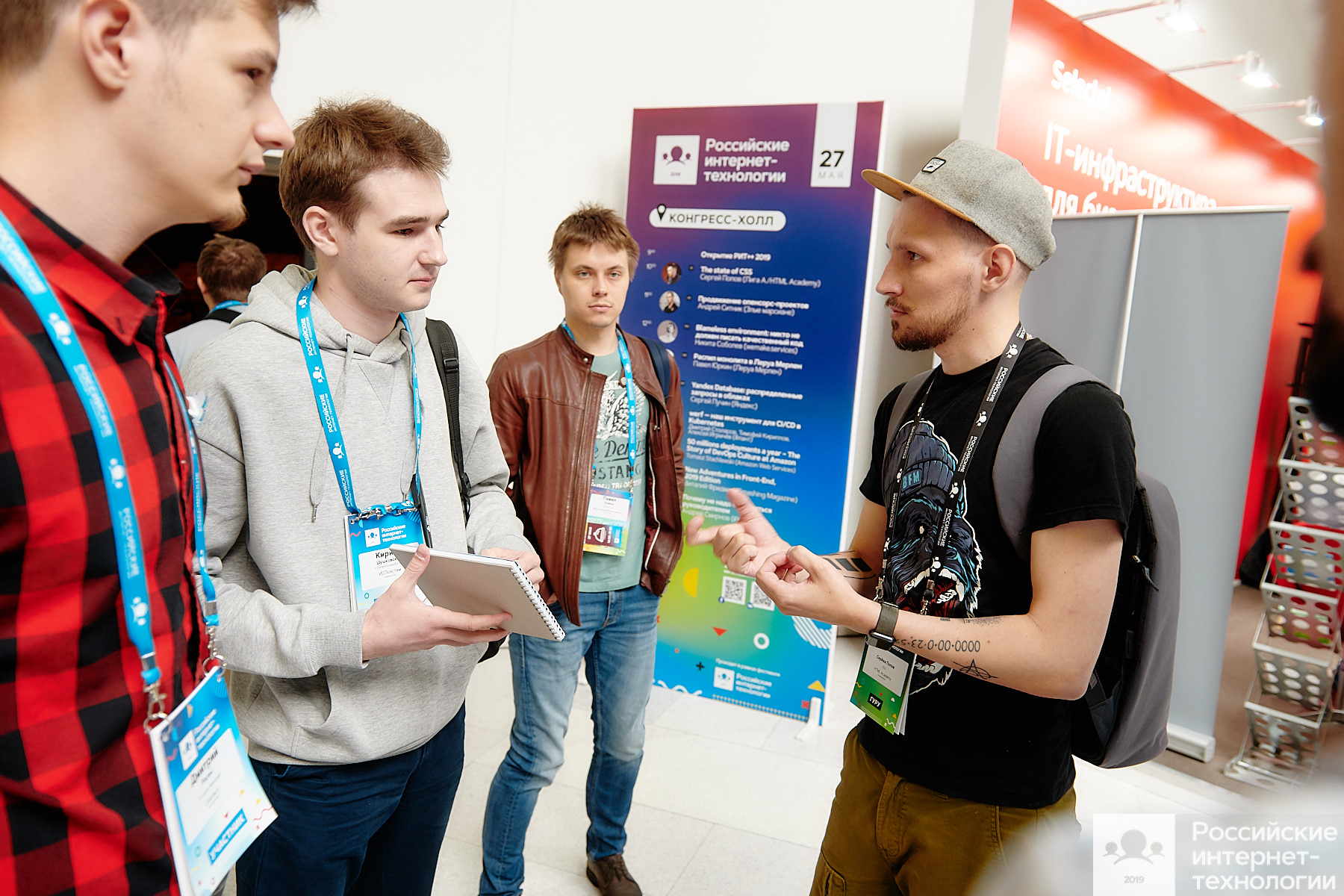
Therefore, for development it is worth attending any conference, within reasonable limits.
Why visit FrontendConf? Compared to other Russian serial conferences, it is carefully prepared by a strong PC. The committee has experienced market guys who were selected to prepare the program.
In the PC, we think for a very long time on the schedule, on the convenience of participants and speakers. Inside, there are constant debates, discussions, proposals on how to improve the conference, which gives the result in the form of a strong program. Nowhere else have I seen so much time and energy spent on PCs on the program, selecting applications, preparing the conference and making reports cool.
From the point of view of the program, FrontendConf differs from other conferences in that it focuses on “hardcore”. There are good simple reports, there are medium, but most of all “hardcore” ones. There are no reports on the frontend like on the FrontendConf anywhere else.
This gives its some problems. For example, for a newcomer who has never performed before, it will be difficult to get to FrontendConf, as at his first conference - there are experienced speakers here. But this does not exclude the possibility that there are beginners in the program. Sometimes people come across who are given speeches right away.
Due to the combination of all these factors, a very strong program is obtained. FrontendConf is great for learning. But, in addition to knowledge, FrontendConf is also suitable for networking. Many representatives, developers and speakers from various companies come not only from Russia, but also from neighboring countries. Therefore, the benefits of networking are no less than learning.

On the eve of FrontendConf, we interviewed Sergey Popov (@sergeytovarov) and asked about everything in more detail. Sergey is a member of the PC, leader League A., speaker. We asked him how the preparations for the conference are going, what reports he takes to curate and what to expect from the audience, why he is speaking, what his new report is about, and why to attend the conference.
About PC and Speeches
- Tell us about your experience. What do you do professionally, what do you do in FrontendConf?
 Sergey : In short, I worked for more than 8 years as a layout designer, front-end developer, and UI developer. I was always closer to the design side and layout of the interface than to JavaScript and interaction with the backend.
Sergey : In short, I worked for more than 8 years as a layout designer, front-end developer, and UI developer. I was always closer to the design side and layout of the interface than to JavaScript and interaction with the backend.
For the past two years, I have been leading League A. front-end development outsourcing, and in parallel at HTML Academy I have been leading the direction that graduates are engaged in: from graduation to employment. I control everything that happens to them during this period.
I speak a lot at specialized conferences. I go to them not only for the sake of performances, but also for the sake of the community. I organize conferences, participate in some of them in the same role as in the FrontendConf Program Committee.
In PC, I keep applications from beginning to end: I train, help improve reports, and reveal interesting aspects. The PC has a distribution of "specializations." Everyone does what he has expertise in - so reports get better. My "specialization" - reports on layout, UI, CSS, design, soft skills. These are "light" themes, I do not take "hardcore".
- Why and how did you get on the FrontendConf program committee?
Sergey : I got into the PC about three years ago, and with full immersion I participate in the preparation for the second year in a row. In the past and this year, it was RIT ++ and FrontendConf in Moscow. Prior to that, I helped as a consultant.
I participate in PC because I am interested in community development. I often travel to conferences and see bad reports. Being in the Program Committee, I can share my experience with speakers and influence the situation so that there are fewer bad reports.
Since then, participation in the PC has become more than counseling. We influence more issues, not only reports, but also the program, stage preparation, and concept. We make decisions on which the quality of the conference depends - this is our responsibility. I love such things, and this is another reason why I am in PC.
- How many speakers do you have?
Sergey : Performances take a lot of time and effort. I have repeatedly tried to quit this case. But at some point I realized that conferences are necessary both for work and for constant practice.
I have long outgrown the age when I attended conferences simply because I like it, without any meaning. I am looking for meaning in this for myself, for the main and additional activities, for my own promotion.

I speak a lot: with various reports, with repeated reports, with a series of reports - only about 10-15 performances per year. A decrease in activity is not expected, and it is not yet clear due to what they may become smaller.
Camera Rig, CSS as a programming language and awareness
- How many reports did you oversee for FrontendConf? Tell us more about them, what will be useful for conference guests in them?
Sergey : Only for FrontendConf 2019 I oversaw 15-20 reports. Not all of them were accepted, so I’ll tell you about those that fell into the program.
 Natasha Gabitova will talk about Camera Rig . This is an interesting way to create cool things with WebGL, for example, your own worlds. The feel of the world will depend on the camera. One of the camera control techniques and user experience, respectively, is called "Rig". It will be interesting to listen to how this is done and expand the horizons of any person.
Natasha Gabitova will talk about Camera Rig . This is an interesting way to create cool things with WebGL, for example, your own worlds. The feel of the world will depend on the camera. One of the camera control techniques and user experience, respectively, is called "Rig". It will be interesting to listen to how this is done and expand the horizons of any person.
 The next report is by Andrey Smirnov “ The state of soft skills ”. Andrey will talk about his huge study on soft skills. This is not a retelling of one’s own opinion - the report is based on statistics on interactions, relationships with each other, which are collected from the market. Given that statistics were collected from the front-end, the topic is relevant for FrontendConf participants.
The next report is by Andrey Smirnov “ The state of soft skills ”. Andrey will talk about his huge study on soft skills. This is not a retelling of one’s own opinion - the report is based on statistics on interactions, relationships with each other, which are collected from the market. Given that statistics were collected from the front-end, the topic is relevant for FrontendConf participants.

Nikita Dubko will present the topic “ CSS - a programming language ”. He will talk about how to look at CSS capabilities from a different perspective. Nikita does a great job himself, he doesn’t need to be especially lead, but an opinion from the outside will not hurt anyone.
Nikita spoke in more detail about his report in a separate interview .
 Next - Victor Rusakovich with a report on skeletons . He will tell you how to improve the download experience if your application loads for a long time and you can’t do anything about it. With the help of skeletons, it is possible to improve the perception of a long load when the page is schematically displayed at the time of loading. He will tell about everything: what is it, why and how.
Next - Victor Rusakovich with a report on skeletons . He will tell you how to improve the download experience if your application loads for a long time and you can’t do anything about it. With the help of skeletons, it is possible to improve the perception of a long load when the page is schematically displayed at the time of loading. He will tell about everything: what is it, why and how.
 Sofya Valitova from VK will talk about data types in CSS . This is a report on CSS programming, not about internal typing. Sophia ran into a rather simple problem - with the
Sofya Valitova from VK will talk about data types in CSS . This is a report on CSS programming, not about internal typing. Sophia ran into a rather simple problem - with the calc()
function, which worked out the wrong way. But to understand how it works, I had to plunge into the bowels of the specification and pull out everything that was possible from there. I love people who read specifications. Therefore, I liked the report, and it will be even better for the conference.
 Nastya Kalashnikova will make the rules of a conscious career as a developer . She is a very cool soft skills specialist, practicing psychologist and HR in IT. She will have a helpful presentation on how and why you need to be aware of certain things that happen in your career. Nastya will show by examples what can be achieved if one approaches the career consciously, and what will happen if this is not done.
Nastya Kalashnikova will make the rules of a conscious career as a developer . She is a very cool soft skills specialist, practicing psychologist and HR in IT. She will have a helpful presentation on how and why you need to be aware of certain things that happen in your career. Nastya will show by examples what can be achieved if one approaches the career consciously, and what will happen if this is not done.

I also oversee the report by Julia Muzafarova “ Make a World on Pure CSS ” about cool animations in CSS. Julia will tell you how to make complex animations, why it is needed, why it’s interesting how it pumps skills and allows you to look at CSS in a new way.
Each report is interesting in its topic and in its direction. I hope everyone will like them.
- Among these reports there are many experienced speakers, but there are also beginners. Who is easier to work with?
Sergey : All the guys are experienced, but someone has more. Relatively speaking, Nikita Dubko, Andrey Smirnov are experienced speakers, they speak a lot, but there are those who speak less. The more experienced ones are easier, because you practically don't have to work with them. They are able to independently evaluate what they are doing. They do not need special advice, only a view from the side.
On the other hand, the opinion of the PC will not always be heard by the speaker if the views differ. Perhaps the speaker will even agree on something, but the experience of speaking requires speaking differently.
Beginners are easier to direct in the desired interesting direction. I look at the report from a position of interest to the audience. My task, as a curator, is to bring him to a state where he is interesting to everyone. It is easier with newcomers - they are more responsive and listen to the opinion of the curator.
- Tell me how you helped the speakers? Describe the front of the work, interesting chips that you came up with?
Sergey : To think up chips for reports is not my job. I help turn the topic in the right direction, add or remove depth to some parts of the report. My job is structure, presentation and content. There were a couple of cool chips that we came up with as part of this work, but you will see them already at the conference.

The front of work is quite simple: look at the application, evaluate how interesting it is, call the speaker, understand what to throw out of the report and what to add. Further work out the program, structure, presentation, to drive on phoning and in person.
- Will you be present at the reports of your wards?
Sergey : Physically I can’t do it. Considering how many reports passed through me, and the fact that I have my own presentation , that the reports will go in parallel, and the conference itself is dense and there are organizational issues, it’s impossible to listen to everyone.
- Is there an element of competition between the curator and the curated one?
Sergey : There is a constructive dialogue when the curator says how to change, and the person being supervised accepts this or does not accept it. This is quite interesting, because in such disputes something interesting is born.
If we talk about competition in terms of selection for the program, then no, the curator does not have any privileges. All submit reports in a general stream. All reports are recorded on the runs, get votes and get into the program if they are good.
PC participants often get into the program, but this is because most of them are practicing speakers. Since they are experienced and seasoned, it is highly likely that their report will be screened.
If a person who is not from the PC knows how to get into the program, because he has performed a lot and can prepare an interesting and exciting presentation, then he can also do this from the committee. We do not have quotas for the number of reports from the PC. We can let at least everything. The question is different - if they are uninteresting, they will be wrapped up at the discussion stage and simply will not go through the first stage. The PC has no privileges.
About the benefits of conferences
- The FronendConf program announced your report on subgrid. What is he talking about, what should the listeners expect?
Sergey : Now this is the first report on the second-level grids in the Russian-speaking space. Subgrid appeared in stable browsers, the specification has matured. I believe that the time has come to tell what is hidden in these specifications, what opportunities it will open for layout designers and when to wait for all this.

We can say that the report is a continuation of what I talked about Grid three years ago at FrontendConf. This was the first report on the topic, then there was a series of reports on how to use this in production, and now the continuation of the second level grids. After some time, there will be reports from the series “Let's use all this in this and that way”.
Note: at FrontendConf RIT ++ in 2017, Sergey talked about how the “fresh” Grid Layout is used in the work , and a year later, that the Grid Layout is the basis of modern layout . In May, at RIT ++, Sergey made a report on a survey of frontend developers The State of CSS . Grids were not the main topic, but part of the report.
- The final question. Why, in your opinion, need to attend conferences and FrontendConf, in particular?
Sergey : To develop, you need to get information from somewhere, for example, using reports. But conference presentations are just some of the benefits of the conference.

Most of the benefits of conferences are networking, communication, development, immersion in the community.
Therefore, for development it is worth attending any conference, within reasonable limits.
Why visit FrontendConf? Compared to other Russian serial conferences, it is carefully prepared by a strong PC. The committee has experienced market guys who were selected to prepare the program.
In the PC, we think for a very long time on the schedule, on the convenience of participants and speakers. Inside, there are constant debates, discussions, proposals on how to improve the conference, which gives the result in the form of a strong program. Nowhere else have I seen so much time and energy spent on PCs on the program, selecting applications, preparing the conference and making reports cool.
From the point of view of the program, FrontendConf differs from other conferences in that it focuses on “hardcore”. There are good simple reports, there are medium, but most of all “hardcore” ones. There are no reports on the frontend like on the FrontendConf anywhere else.
This gives its some problems. For example, for a newcomer who has never performed before, it will be difficult to get to FrontendConf, as at his first conference - there are experienced speakers here. But this does not exclude the possibility that there are beginners in the program. Sometimes people come across who are given speeches right away.
Due to the combination of all these factors, a very strong program is obtained. FrontendConf is great for learning. But, in addition to knowledge, FrontendConf is also suitable for networking. Many representatives, developers and speakers from various companies come not only from Russia, but also from neighboring countries. Therefore, the benefits of networking are no less than learning.
Seven reports of speakers, which are supervised by Sergey, are already in the FrontendConf 2019 schedule, and he himself speaks on the first day in the second hall. In addition to subgrid, skeletons and evidence that CSS is a programming language, advanced TypeScrypt, React Native and the fight against legacy code are waiting for us. A full report card with a description and distribution of time and rooms is in the conference schedule .
Subscribe to the newsletter to keep abreast of news, new articles and announcements of the conference, and also book tickets until the deadline for price increases in 4 days.
All Articles